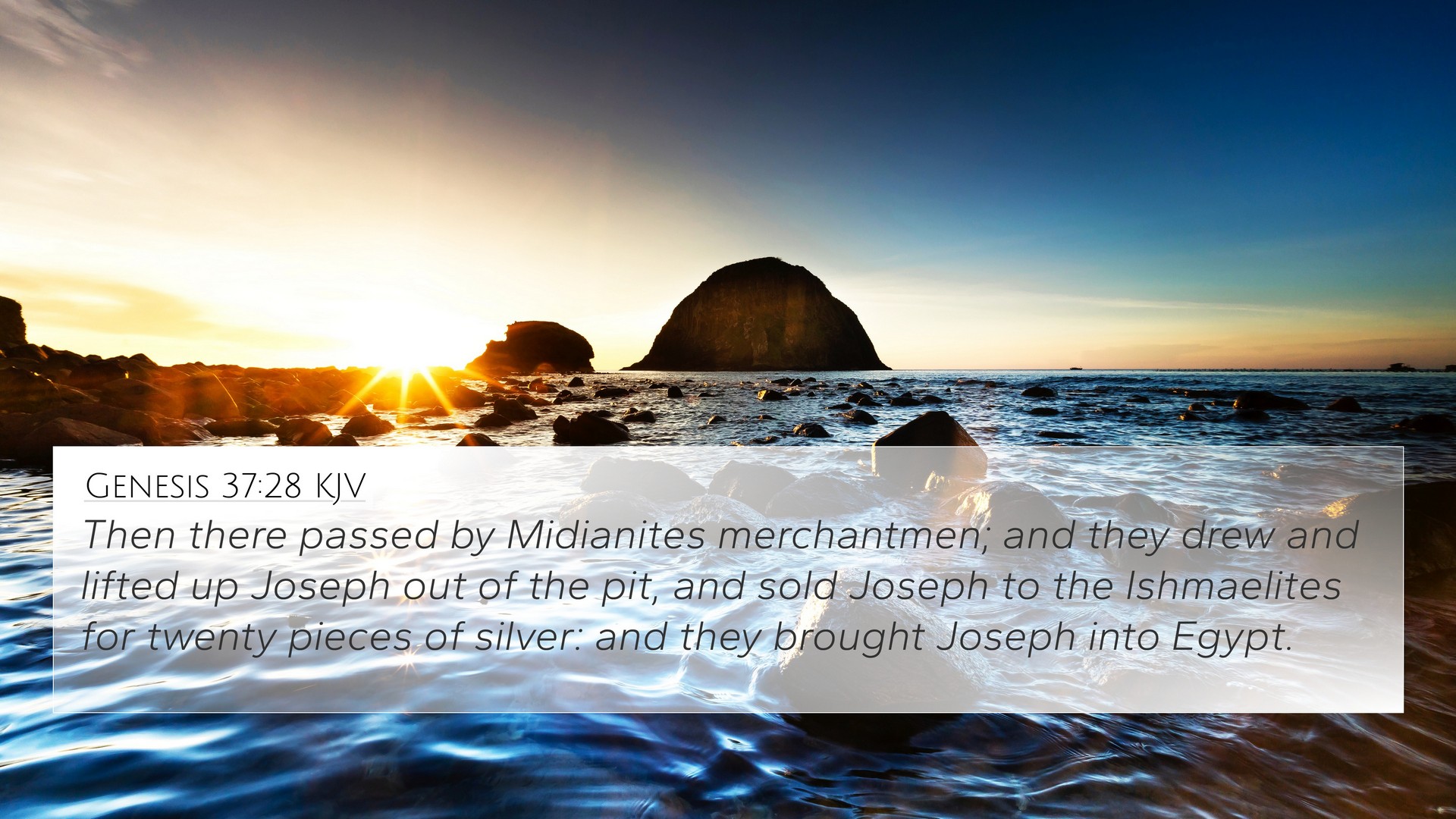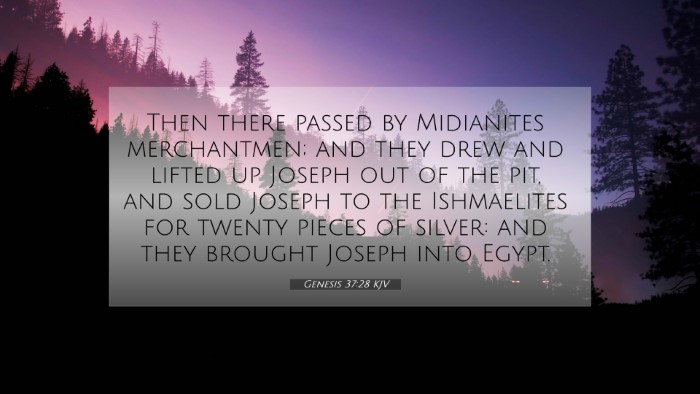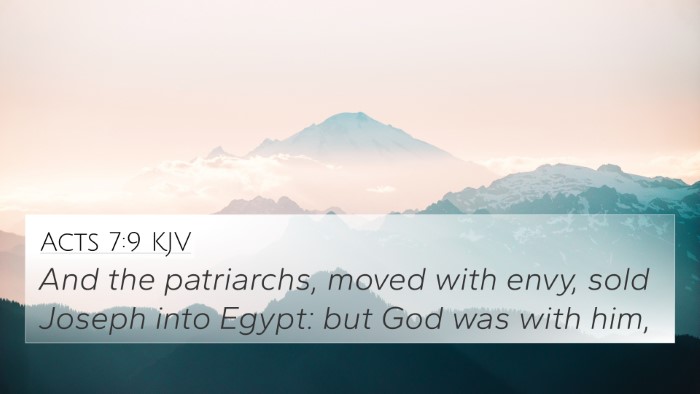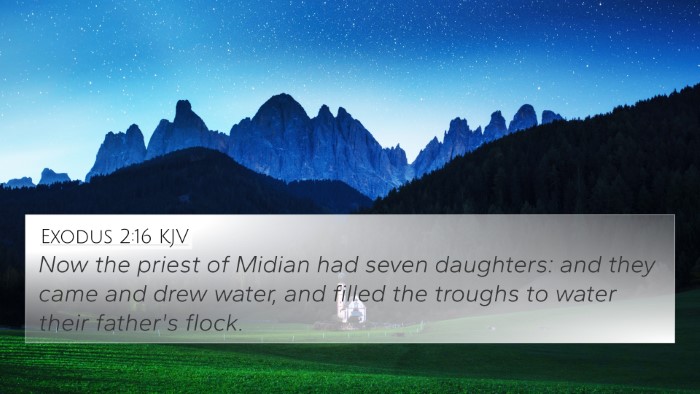Understanding Genesis 37:28
Genesis 37:28 reads: “Then there passed by Midianites merchantmen; and they drew and lifted up Joseph out of the pit, and sold Joseph to the Ishmaelites for twenty pieces of silver: and they brought Joseph into Egypt.”
This verse presents a dramatic turning point in Joseph's life, marking his transition from being favored son to a slave in Egypt. Scholars and commentators provide rich insights into this pivotal moment, which reveals more than just the narrative but also profound theological implications.
Exegesis and Commentary Overview
In examining Genesis 37:28, we can draw from various public domain commentaries to analyze its meaning more comprehensively. Each provides a unique perspective on the themes present in the passage.
Matthew Henry's Commentary
Matthew Henry emphasizes the cruelty and betrayal involved in Joseph's sale. He highlights that Joseph's brothers, driven by jealousy, reacted in a way that signifies the darkest facets of human nature. Henry notes that this act of betrayal was not only a familial conflict but also foreshadowed Joseph's future trials and ultimate glorification in Egypt, reflecting God’s providence amid human folly.
Albert Barnes' Notes
According to Albert Barnes, the reference to "Midianites merchantmen" illustrates the nature of commerce in ancient times, signifying how human life, including Joseph's, was treated as a commodity. Barnes draws attention to the fulfillment of the familial prophecy that Joseph’s dreams would serve as a foundation for his subsequent rise to power, indicating the divine orchestration behind his trials.
Adam Clarke's Commentary
Adam Clarke expands on the implications of the “twenty pieces of silver” as the price for Joseph’s life. He articulates the significance of this transaction, not only as a betrayal by his brothers but as an act that mirrors the later betrayal of Christ for thirty pieces of silver, illustrating a prophetic connection that spans the Bible.
Thematic Connections and Cross-References
Exploring Genesis 37:28 through thematic Bible verse connections reveals deeper insights and verses that relate to this passage:
- Genesis 37:26-27: Reuben's intervention highlights the fratricidal conflict and desire for repentance.
- Matthew 26:14-16: The betrayal of Jesus for silver reflects the same themes of betrayal among kin.
- Acts 7:9-10: Stephen references Joseph's sale as part of his larger sermon on Israel’s history.
- Psalm 105:17-19: This psalm reflects on Joseph's suffering and God's overarching plan.
- Romans 8:28: The assurance that God works all things together for good links to Joseph’s ultimate benefit from his trials.
- Genesis 50:20: Joseph eventually states that what his brothers meant for evil, God intended for good.
- Hebrews 11:22: Highlights Joseph’s faith concerning the future of Israel, indicating his understanding of God’s promises.
- Luke 5:10: Signifies the future calling of fishermen disciples, relating to Joseph's salvation of his family during famine.
- Genesis 41:46: Details Joseph's rise to power, which is directly connected to this act of betrayal that led him into Egypt.
- 1 Peter 2:19-23: Discusses unjust suffering, mirroring Joseph's experiences and ultimate reward.
Connecting Themes Through Cross-Referencing
The act of selling Joseph is not merely a familial rupture but also a theological motif that reverberates through scripture. It illustrates the
connections between biblical themes of betrayal, suffering, and eventual redemption.
Through tools for Bible cross-referencing and analysis of these connections, we see a unified narrative across the entire biblical text that God uses human actions, even those rooted in sin, for divine purposes.
Application for Study
While studying Genesis 37:28, consider how to use Bible cross-references effectively. By identifying connections between Old and New Testament themes, readers can obtain a comprehensive view of scriptural meanings. Engaging in cross-referencing Bible study methods will ensure a deeper understanding of the biblical narrative.
Realizing how specific verses relate and support one another encourages a richer engagement with scripture. For example, recognizing the link between Joseph’s sale and Jesus’ betrayal enhances comprehension of God's plan throughout history and His faithfulness despite human actions.
Conclusion
Genesis 37:28 serves as a vital point in understanding the life of Joseph within the Biblical framework. By examining insights from noted commentators and utilizing a cross-referencing approach, readers can arrive at a thematic understanding that enriches their study and application of scripture. The act of selling Joseph emerges as a moment laden with both personal and cosmic significance, rooted deeply in the unfolding story of salvation history.





















